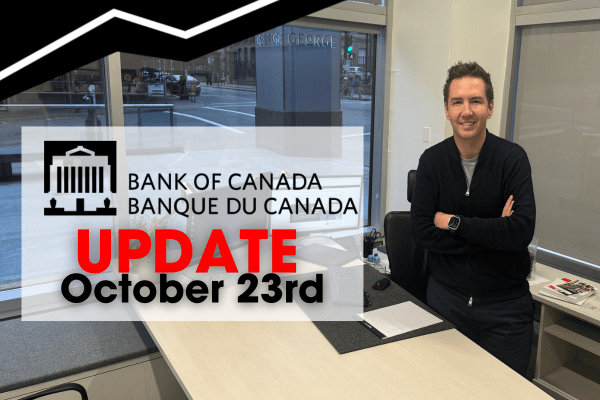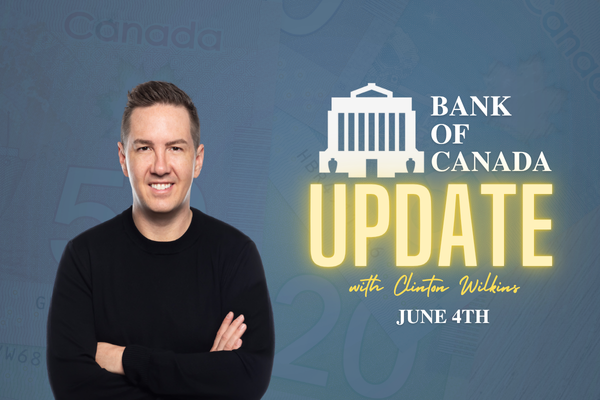Clinton Wilkins joins Todd Veinotte on 95.7 News Radio to discuss The Bank of Canada holding its key policy rate at 2.75%, marking the first pause after seven consecutive cuts.

Bank of Canada Update – Interest Rates Cut – October 23rd
Clinton Wilkins joins Rob Snow on CityNews Everywhere to chat about the Bank of Canada cutting interest rates by 50 basis points! Clinton notes that fixed and variable rates move independently, and while fixed rates remain low, variable rates are becoming more attractive.
Bank of Canada Rate Cut and Its Impact on Mortgage Industry
Rob Snow
We’ve been talking about the economy today, because it is Bank of Canada Day. Bank of Canada cut interest rates by 50 basis points. Today, there was a lot of speculation about just how much the Bank of Canada would cut rates, that it would cut rates was not really in doubt. It’s just by how much? So now we know it’s 50 basis points. Our good friend Clinton Wilkins has joined us from the Clinton Wilkins Mortgage team in Dartmouth, Nova Scotia. Hello.
Clinton Wilkins
How you doing? I’m good.
Rob Snow
How are you?
Clinton Wilkins
I’m doing great. It’s a good day to be working in the mortgage industry. I think there’s a lot of happy people out there.
Rob Snow
Okay, why do you say that?
Clinton Wilkins
You know, I think having a 50 basis point cut, and economists, you know, really projecting that we’re going to see several more cuts going into the end of next year. I think it’s great news for Canadians. It’s really great news for anyone you know, looking to buy a home. You know, the cost of boring will be less if you take a variable rate mortgage. And for existing homeowners, you know, if you’re in a variable rate mortgage right now, your payment is going to go down or your amortization is going to get shorter. So certainly good news. And a lot of borrowers are certainly optimistic now. And I think the optimism we’re really feeling it right now. Rob, I will say this October, it’s been one of the busiest Octobers that we’ve ever had. I would compare it to the types of transaction we would normally see in a June, July, August type time frame, and it may have been slightly delayed this year just because the rates were high, and now starting to go down, and obviously down even more with this jumbo rate cut. I think consumers that were maybe on the sidelines. Have now decided that it’s time to start transacting.
Rob Snow
So compare the Summer to the early Fall here. What’s been the difference?
Clinton Wilkins
In activity? I think the difference is the activity that we’re seeing here in the Fall. It’s normal Spring activity. Normally, you know, the business starts getting a little bit slower going into the end of the year. There’s not as many property transactions going on. I think anyone that was planning on potentially refinancing had already maybe done it for the year. It was more of a normal cadence of business. Right now I would say it’s one of the busiest months, if not the busiest month all year. And I expect that going into the end of the year, we’re going to continue to see this level of activity. I think it’s really being driven by the rates. I think even with existing homeowners, a lot of people were really holding off on their mortgage renewals or refinance transactions with hoping the rates were going to go down. And we’re certainly seeing the rates go down right now, obviously with the announcement.
Rob Snow
After today, with this 50 basis point move from the Bank of Canada, what do you expect is going to be out there in terms of fixed and variable in various terms?
Clinton Wilkins
That brings up a really, really good point. The fixed rates and the variable rates move completely independently of each other. Many lenders are even putting out communication this week and the last couple weeks that we may even see fixed rates increase. It’s what happened in the US, the Feds cut the rate by 50 basis points, and by and large, fixed rates increased by 50 basis points. So it’s not a one to one connection. And I think that’s a misconception that a lot of consumers think that just because the bank in Canada lower the key overnight rate today, fixed rate mortgages are suddenly going to become less expensive. That’s not the case. What has happened today is consumers can get a variable rate mortgage now in the high fours or low 5% range, which is certainly moving in the right direction. And the amount of spread between where a fixed rate and a variable rate mortgage is today, that gap has been reduced. So many more consumers are likely going to be thinking about doing a variable rate mortgage right now, Rob, especially if they can stomach what’s going on with the rates. It will be more expensive than a fixed because fixed rates right now are in the fours, very low fours to mid fours, depending on the types of transactions that we’re doing. So the fix will, or the variable will still be more expensive than fixed. But I think the smart consumers, the consumers that can really hold on for the next six to 12 months, the variable will be cheaper. Historically, it is cheaper. I mean, right now we’re in an inverse situation. We’ve really been here for the last 18 to 24 months, but the variable certainly will be cheaper than fixed in the coming months, and we’re going to extend more rate cuts from the Bank of Canada.
Consumer Behavior and Market Dynamics
Rob Snow
So with the stress test. What are people having to qualify at these days?
Clinton Wilkins
Depends on what type of product they’re taking. Okay, but if you’re doing a fixed rate product, for example, and let’s say you’re able to get a fixed rate somewhere around four and a quarter, you would be qualifying at a rate of six and a quarter. Certainly a big difference than what we were seeing even a year ago, where many clients were qualifying, you know, at 7,8, or 9, percent in terms of their qualifying. So consumers can certainly afford a larger mortgage, and that’s certainly helping with qualification. But I think even with existing homeowners, you know, if they’re looking at doing a refinance or, a transfer between different lenders, t’s making it a lot easier for borrowers to be able to qualify now. So
Rob Snow
I guess, you know, you think that the rest of this month, maybe the rest of the year, probably be be pretty busy, jumbo rate hike, might a lot of people. I mean, why would I? Why would I take out a mortgage, you know, in July, if I think the rate is going to be lower in October? And now here it is, right,
Clinton Wilkins
Exactly. And, I mean, the right time to transact for people is the right time for them. Everybody’s situation is different, and that’s what we really need to be cognizant of. When looking at a mortgage transaction, we’re really looking at people’s income, assets and credit, and depending on what their situation is, it’s not so much rate dependent. Sometimes they need to transact, when they need to transact, I think, as a mortgage broker and an unbiased mortgage professional, we want to provide the best advice to those consumers at the right time that’s going to work for them. Certainly, there’s a lot of noise in the media around what’s going on with mortgage rates. Even the Prime Minister put out a tweet on Twitter today about the Bank of Canada lowering the key overnight rate and mortgages being more affordable. So everyone’s talking about it, and I think they’re certainly going to become even more affordable in the coming months and years. The challenge that we need to remember, when these rates really start going down more significantly, we’re going to see a lot more activity in the real estate market. Okay, and I think that’s going to drive the prices up. Thanks, Rob.
Rob Snow
Okay Bye!


